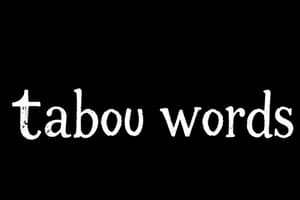Podcast
Questions and Answers
Ano ang pinaniniwalaang unang paggamit ng salitang 'OK' sa kasalukuyang anyo nito?
Ano ang pinaniniwalaang unang paggamit ng salitang 'OK' sa kasalukuyang anyo nito?
- Sa isang pahayagan sa Boston noong 1839 (correct)
- Sa isang kanta noong 1700s
- Sa isang aklat sa Estados Unidos noong 19th siglo
- Sa isang palabas sa telebisyon noong 1800s
Ano ang pinagmulan ng salitang 'OK' ayon sa pangkalahatang paniniwala?
Ano ang pinagmulan ng salitang 'OK' ayon sa pangkalahatang paniniwala?
- 'Excellent'
- 'Correcto'
- 'All correct'
- 'Oll korrect' (correct)
Paano karaniwang ginagamit ang 'OK' ngayon upang ipahayag ang pagpayag o pagsang-ayon?
Paano karaniwang ginagamit ang 'OK' ngayon upang ipahayag ang pagpayag o pagsang-ayon?
- 'I don't know', 'I have no idea'
- 'Not OK', 'I disagree'
- 'That's OK', 'I'm OK with that' (correct)
- 'Superb', 'Excellent choice'
Ano ang kahulugan ng 'OK' kapag ito ay ginamit bilang abbreviation?
Ano ang kahulugan ng 'OK' kapag ito ay ginamit bilang abbreviation?
Ano ang kultural na kahalagahan ng salitang 'OK', batay sa nabanggit na teksto?
Ano ang kultural na kahalagahan ng salitang 'OK', batay sa nabanggit na teksto?
Ano ang kahalagahan ni 'OK' ayon sa nabasa mo?
Ano ang kahalagahan ni 'OK' ayon sa nabasa mo?
Theoretical probability is based on observing the results of an experiment.
Theoretical probability is based on observing the results of an experiment.
Experimental probability involves calculating the number of favorable outcomes divided by the total possible outcomes.
Experimental probability involves calculating the number of favorable outcomes divided by the total possible outcomes.
The probability of flipping heads and tails in a fair coin is both 1/2 according to theoretical probability.
The probability of flipping heads and tails in a fair coin is both 1/2 according to theoretical probability.
Probability values can range from -1 to 1.
Probability values can range from -1 to 1.
Weather forecasters use probability to predict the exact temperature of a day.
Weather forecasters use probability to predict the exact temperature of a day.
Insurance companies do not use probability for risk assessment.
Insurance companies do not use probability for risk assessment.
Flashcards are hidden until you start studying
Study Notes
"OK" - An Unremarkable Word with a Huge Impact
"OK" is one of those words that is so commonplace that it often goes unnoticed. It's a simple two-letter word that is easy to pronounce and to use in everyday conversation. Yet, its usage is far-reaching and spans across various aspects of our lives. In this article, we will explore the history, usage, and cultural significance of the word "OK."
Origin of "OK"
The origin of "OK" is somewhat unclear, but it is generally believed to have originated in the United States in the 19th century. The first recorded use of the word in its current form was in a Boston newspaper in 1839, where it was used to describe the successful completion of a task. The word is likely a contraction of "oll korrect" or "all correct," which was a humorous way to say "excellent" or "correct."
Usage of "OK"
Today, "OK" is used in a variety of contexts. It is often used to express agreement or approval, as in "That's OK" or "I'm OK with that." It can also be used to indicate that something is satisfactory or acceptable, as in "The food was OK" or "The movie was OK, but not great." In addition, "OK" is commonly used as an abbreviation for "okay," which means "all right" or "satisfactory."
Cultural Significance of "OK"
Despite its seemingly insignificant nature, "OK" has become a cultural phenomenon. It has been used in various forms of media, from movies to literature to music. For example, the novel "OK" by Tao Lin explores the word as a topic in its own right. Additionally, "OK" has been used as a meme and a form of internet slang.
Conclusion
In conclusion, "OK" is a simple word that has a huge impact. Its history, usage, and cultural significance are all indicative of its importance in our daily lives. Whether you use it to express agreement, approval, or satisfaction, "OK" is a word that is here to stay.
In summary, "OK" is a word that has been part of our language for centuries and continues to be relevant in the present day. Its versatility and familiarity make it a staple of everyday conversation and a powerful tool in communication. Despite its simplicity, "OK" is a word that speaks volumes.
Studying That Suits You
Use AI to generate personalized quizzes and flashcards to suit your learning preferences.



